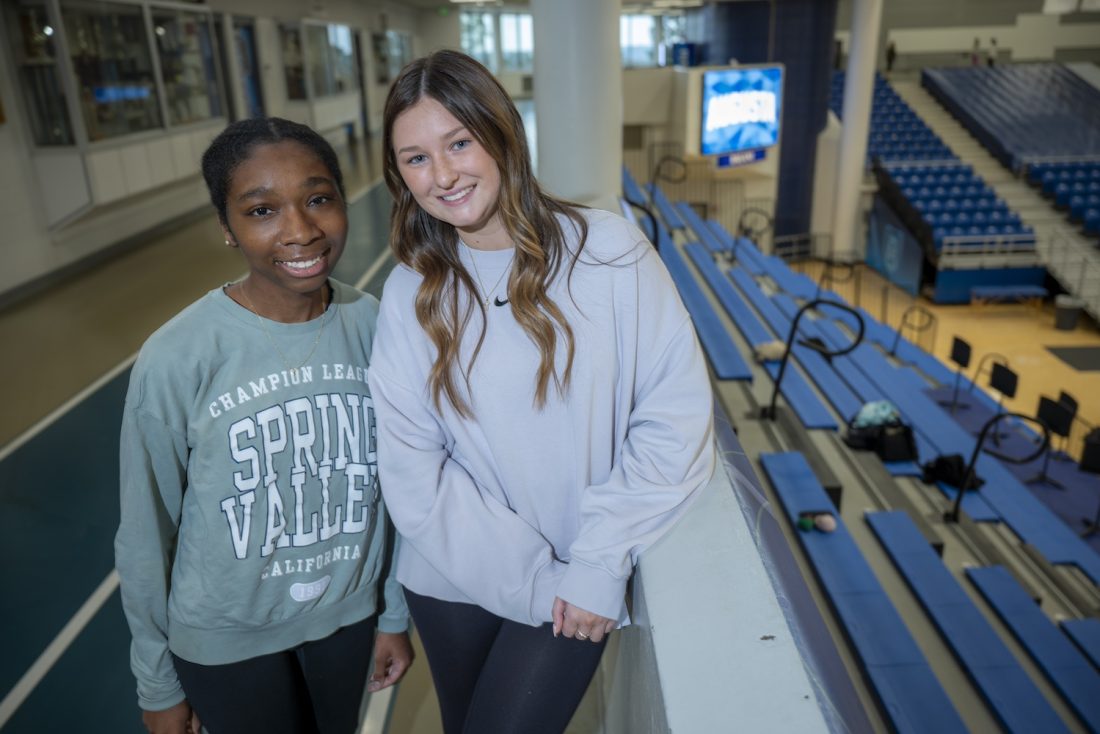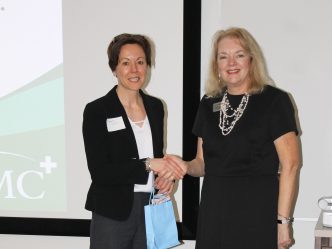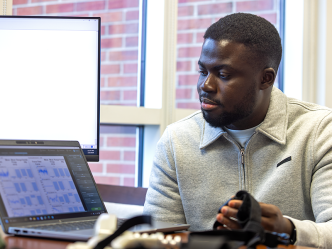Angel Lexley, a first-year undergraduate kinesiology student from Savannah, Georgia, did not know a soul when she first stepped on Augusta University’s campus last fall.
“I actually applied to Augusta University really late, so I wanted to get to know as many people as possible when I got to campus,” Lexley said. “I happened to get this email about the Jags4Jags Mentoring Program, which pairs a first-year student with a peer mentor, and I thought, ‘Oh, this would be a cool way to connect with somebody who’s already established here. And maybe they can help me find clubs, meet other people and open up my horizons.’”
After signing up for the Jags4Jags Mentoring Program, Lexley was paired with Gracyn Bennett, a third-year undergraduate kinesiology student who also happens to be from Savannah.
The two students automatically clicked.
“We are very similar. It’s just kind of crazy,” Lexley said, laughing. “I honestly feel like it was God’s plan just because how alike we are. I mean we are both kinesiology majors, we are both from Savannah and we both played sports in high school.”
“I think that first night when we went to the Welcome Back Bash, we just connected,” she added. “We had dinner, we talked and it felt really natural. It was like hanging out with somebody that I pretty much knew my whole life.”
The Jags4Jags program was introduced in the fall by Amy Abdulovic-Cui, PhD, associate professor in the Department of Biological Sciences in the College of Science and Mathematics, to enhance new student experience by linking first-year students to mentors who are ready to listen, inspire and help navigate any future challenges.
Abdulovic-Cui was one of the inaugural Provost Faculty Fellows at Augusta University, and the new program was part of her fellowship.
“When first-year students step on campus and are already paired with a mentor who has been through what they are experiencing, they have a connection that forms a strong bond, a relationship, and that helps with self-worth and can help students be more successful,” Abdulovic-Cui said, explaining research shows that when a student has between three and five interactions in any given month with a peer-to-peer mentor, they are more likely to do better academically and remain enrolled. “Having someone close to you in age but still older who you see a bit of yourself in, that has been a proven, successful way for students to want to stay at a school.”
“I think that first night when we went to the Welcome Back Bash, we just connected. We had dinner, we talked and it felt really natural. It was like hanging out with somebody that I pretty much knew my whole life.”
Angel Lexley, a freshman kinesiology student at Augusta University
As a first-generation college student, Bennett said she was more than willing to volunteer as a mentor for the Jags4Jags program.
“I know I could have really used a mentor my freshman year who I could have asked, ‘Hey, did you take this class?’ or ‘Did you have this professor?’” Bennett said. “Instead, I kind of had to figure out things for myself, so I thought this would be a good opportunity for me to help someone else out.”
After all, every first-year student faces some kind of challenges simply because college is a new experience, Bennett said.
“I think I initially struggled with the feeling of being connected on campus, just because there’s several different campuses, and it was hard to meet other people outside of my friend group,” Bennett said. “At first, I was just kind of going home to my apartment and staying in my room instead of going out. But I ended up pushing myself to join a sorority, so I was able to make connections that way.”
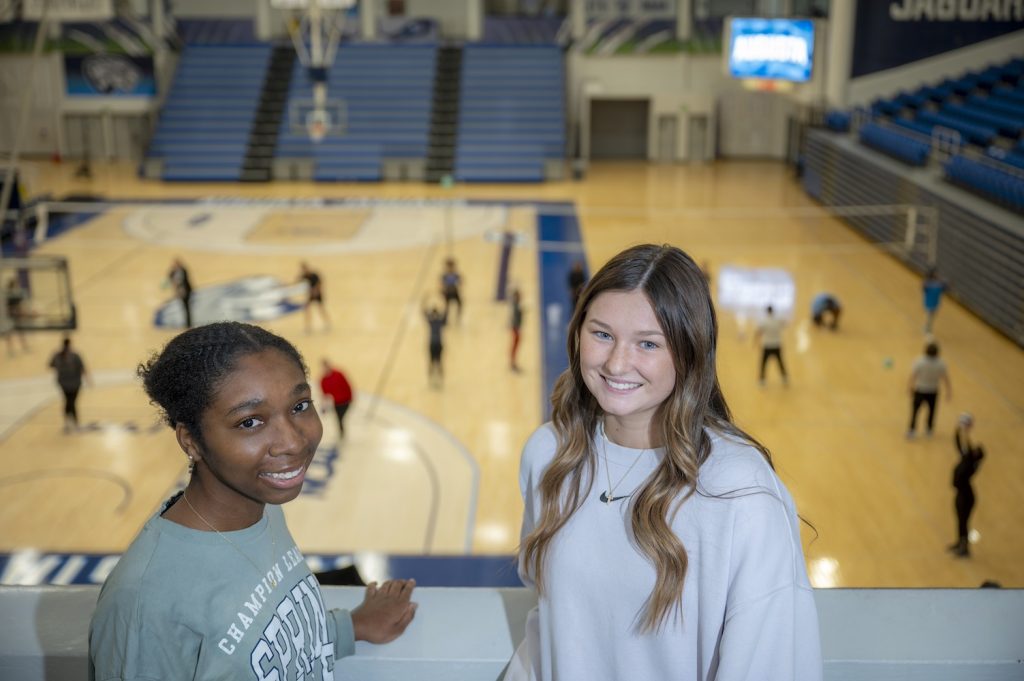
With both students majoring in kinesiology, Bennett said it is helpful because she knows exactly some of the hurdles that Lexley could face in the future.
“For me, I feel like it was difficult to adjust to my classes that first year because high school does not prepare you whatsoever for college,” Bennett said, laughing and shaking her head. “I know that they try to, but nothing can ever prepare you. And I was really struggling with my science classes my first year. I wish I had someone like a mentor to guide me. I kind of just got thrown into the fishbowl and had to figure it out myself.”
For Lexley, Bennett’s guidance and friendship has been invaluable.
“Because we’re from the same hometown, I felt like I could be very open and honest with her. Because that’s just how it is back home. We are very blunt people,” Lexley said, smiling. “I would just always ask her about advice about managing school, managing classes, managing outside activities and stuff like that. And then I think we also really connected because we’re both Christians. So I would ask her a lot of advice when I was kind of struggling in my faith.”
“We can confide in each other as well,” Lexley added. “She is more than a mentor. She’s a friend.”
Keeping first-year students on track
With Augusta University’s goal of reaching 16,000 students by 2030, one of the best ways to get there is through student retention, said Susan Davies, PhD, vice president for the Division of Enrollment & Student Affairs.
“It’s important that once a student commits to coming to AU, that we commit to helping them succeed, and that takes everyone, including their fellow students,” she said. “We have numerous resources on campus directed at student success, but first-year students can be overwhelmed and might not know where to turn. These peer-to-peer mentorships form strong relationships between our students, and that will help them to succeed.”
Madden Jones, a second-year undergraduate student majoring in cellular and molecular biology, was working in the Office of New Student & Family Transitions when he learned about the new Jags4Jags program. After finding out the details of the program, he happily volunteered to help.
In fact, Jones volunteered to mentor five first-year students.
“I think we have a niche population of first-generation STEM students at Augusta University,” Jones said. “And the hard thing about that is, if you come here and you don’t have a guide, you maybe start thinking, ‘I’m lost.’ And the only difference between being lost and giving up and being lost and keeping going is maybe someone else telling you about their experiences. Someone who is there to help give you support and that little push you need to get further down that road.”
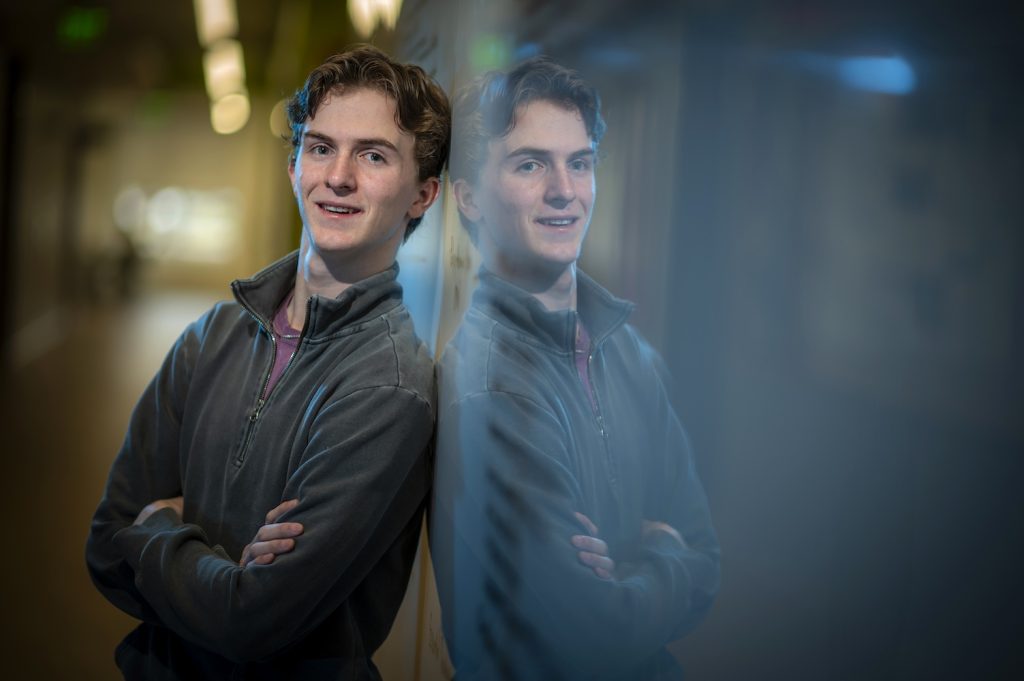
While the Jags4Jags program wasn’t available his first year in college, Jones said he found similar support from his brothers in the Delta Chi fraternity.
“A lot of my brothers were STEM students who would help me out, and I’m grateful for their support,” Jones said. “Because most STEM students are so hyper-fixated on the future. They are like, ‘What’s next? What’s next? What’s next? What’s next?’ Sometimes you feel like you have to solve everything right now. But I’ve learned it is important to just take it semester by semester, and it’ll all get figured out.”
“I think Augusta University does a great job of building community. This program ensures that when a first-year student gets to campus on that very first day, they know that they have at least one person that they could count on to ask questions.”
Madden Jones, a second-year undergraduate student majoring in cellular and molecular biology
One of the first things Jones does when mentoring a STEM student is to sit down with them, look at their track sheet and help map out the courses they will likely take each semester.
“When you arrive on campus, you’re given this really complicated-looking track sheet with a ton of classes on it and it looks super overwhelming,” Jones said. “You immediately start thinking, ‘How am I going to do all of this in four years? There’s just no way.’ But when I meet with my mentee, we sit down for an hour, and we build it out on this program I have called Notion. It sets up all four years, mapping out each semester, and they can see that it’s possible. It puts them at ease.”
Jones, who was born in Texas and moved to Suwanee, Georgia, as a teen, said he knew very little about the Augusta community before moving here last year.
“I was shadowing a physician, Dr. Robert Titelman. He is an orthopedic surgeon in Atlanta,” Jones said. “Dr. Titelman was an alumnus from here, and he said he absolutely loved it. I took his opinion on a whim and applied here and never looked back.”
“I think Augusta University does a great job of building community,” Jones added, explaining that is one of the main reasons he wanted to become a mentor in the Jags4Jags program. “This program ensures that when a first-year student gets to campus on that very first day, they know that they have at least one person that they could count on to ask questions. Because everyone is lost their first day. This program is like giving them a map.”
Building a path forward
While undergraduate students are particularly encouraged to become mentors, there are also plenty of opportunities for graduate, professional and postdoctoral students to join the Jags4Jags program.
Asmat Jahan, who is a fourth-year pharmacy student with the University of Georgia’s College of Pharmacy and is currently doing her rotations at Wellstar MCG Health, graduated with a Bachelor of Science degree in chemistry from Augusta University. Last fall, she decided she wanted to give back to the university that supported her over the years, so she volunteered for the Jags4Jags program.
“I thought it’s a great opportunity to pay it forward,” Jahan said. “I think transitioning from high school to college is a completely different ballgame. In high school, we have our teachers to guide us. In college, we have tons of opportunities out there, which makes it great because you get to learn a lot about yourself. But at the same time, you make decisions independently, which can be scary at times.”
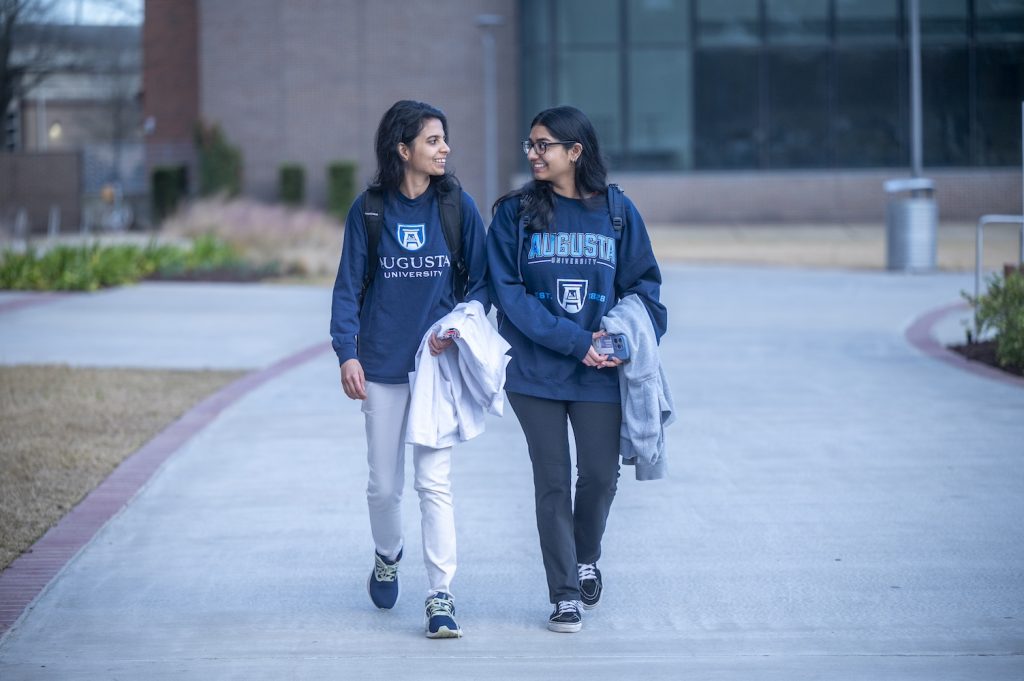
Jahan, who moved to the United States from Karachi, Pakistan, in 2010, said she found a mentor in her chemistry professor at Augusta University, Angela Spencer, PhD.
“I could always talk to her and seek her advice,” Jahan said. “I could always tell her, ‘I know I can do better on this test. What can I do to make myself a more successful student?’ Dr. Spencer helped me transition from high school into my undergraduate career. I don’t think I would have grown or started any more firmly in any other place than here at Augusta University. So, I knew how much of a difference that little guidance can make.”
“When I first came to Augusta University, they were emphasizing a lot on the family atmosphere here, and I was like, ‘There’s no way with such a big school they’re going to have like this family interaction,’ but coming here, it’s only been a semester, and I can definitely feel it through this program.”
Manya Sharma, a first-year undergraduate student from Alpharetta, Georgia
Jahan wanted to be the same kind of mentor to a first-year student. She was paired with Manya Sharma, a first-year undergraduate student from Alpharetta, Georgia, who is enrolled in AU’s Professional Scholars Program seeking a BS-DMD degree.
“When I first came to Augusta University, they were emphasizing a lot on the family atmosphere here, and I was like, ‘There’s no way with such a big school they’re going to have like this family interaction,’ but coming here, it’s only been a semester, and I can definitely feel it through this program,” Sharma said. “It is a really great way to get advice because there’s so many opportunities here that it’s almost like, you feel like you’re going to miss out on something. But I think talking to Asmat about all of the opportunities here kind of helped me figure out where I want to go.”
Jahan said it has been a privilege getting to know Sharma and watching her grow as a student.
“I think Manya is very independent. She’s so intelligent and hardworking. And she is an exceptional student,” Jahan said. “As her mentor, I wanted to expose her to other opportunities, like building on extracurriculars, keeping a work/life balance, making time for herself and keeping wellness as part of her curriculum, as well as just being part of different groups to help create a community that supports her.”
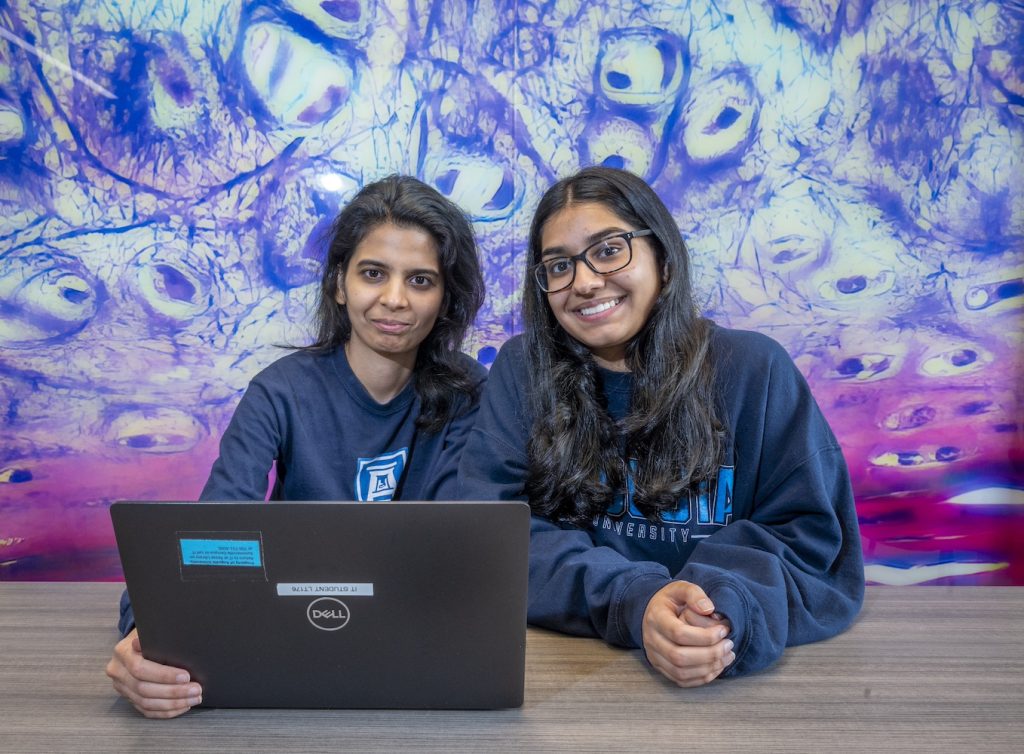
Jahan said she routinely checks in with Sharma on a weekly basis to offer any assistance or guidance that might be needed. The two students have already built a solid bond that both believe will last for years to come.
“That little bit of guidance, that little bit of push is what helps us be excellent in the career we’re going into,” Jahan said. “I would definitely recommend the Jags4Jags program to any upcoming undergraduate students. The truth is, Manya teaches me a lot. As much as I teach her. And she will have me for the rest of her time at Augusta University, at the Dental College of Georgia and beyond.”
 Augusta University
Augusta University
